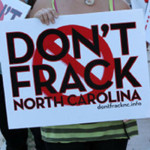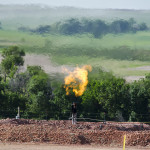The Oscars are coming on Sunday, and one of the movies up for best documentary, Gasland, has a scene in which a woman goes down to her local creek and discovers that after fracking wells had been dug on her land, animals, including rabbits, birds, frogs, began dying. She is horrified and keeps the animals in her freezer as evidence, but no one takes her seriously.
What is fracking?
I hadn’t even heard of fracking until we received our annual holiday letter from a friend in Pennsylvania who spoke about how her town is being invaded—not by an army, but by the gas and oil industry. Her family has lived in the same farmhouse for generations, but now her way of life is threatened because of fracking.
Fracking, or hydraulic fracturing, is a means of natural gas extraction used in deep natural gas well drilling. Once a well is drilled, millions of gallons of water, sand, and chemicals are injected, under high pressure, into a well. The pressure fractures the shale and props open fissures that allow natural gas to flow more freely out of the well. Fracking uses a mixture of hundreds of chemicals and millions of gallons of water per frack. This water then becomes contaminated and must be cleaned and disposed of.
Fracking is being touted as an alternative energy source that has few environmental consequences and as a means of employment for people in depressed areas. That’s all fine and good, except there are huge problems with fracking, namely that it may taint drinking water, its waste water potentially harms both people and wildlife, and it causes innumerable other problems, including possible health issues for people who live near the wells.
Here are just a few of the problems of fracking, from the Gasland site:
–For each frack, 80-300 tons of chemicals may be used. Presently, the natural gas industry does not have to disclose the chemicals used, but scientists have identified volatile organic compounds (VOCs) such as benzene, toluene, ethylbenzene and xylene.
–In 2005, the Bush/ Cheney Energy Bill exempted natural gas drilling from the Safe Drinking Water Act. It exempts companies from disclosing the chemicals used during hydraulic fracturing. Essentially, the provision took the Environmental Protection Agency (EPA) off the job. It is now commonly referred to as the Halliburton Loophole.
–The average well is up to 8,000 feet deep. The depth of drinking water aquifers is about 1,000 feet. The problems typically stem from poor cement well casings that leak natural gas as well as fracking fluid into water wells.
The Halliburton Loophole
The filmmaker Josh Fox interviewed people all over the country, people who were desperate to get help, but couldn’t. Why couldn’t they get help? Because of the Halliburton Loophole, people are powerless because the gas and oil industry is not obligated to report which chemicals have been used in fracking. Therefore, they aren’t responsible for any possible health or environmental problems associated with fracking.
For me, the saddest interview was one with a rancher whose way of life for generations is threatened by fracking. He’s trying to raise cattle in the old-fashioned way on a small family-owned ranch, but he is worried that the water the cattle drink and the grass they eat is now tainted and he might have to leave his land.
The filmmaker visited fracking sites where the waste water had collected near the wells, a virtual petri dish of toxic chemicals, which wildlife, including, of course, frogs, could easily have access to. What surprised us was how widespread fracking has become. It isn’t just in a few places here or there, but in hundreds of places across the country. Click here to see the areas of the U.S. where fracking is occurring.
The oil and gas industry is so powerful in this country that it actually tried to have the Academy of Arts and Sciences retract the Oscar nomination from Josh Fox. Luckily the issue is starting to get some publicity. The actor, Mark Ruffalo, for example, has taken up the anti-fracking cause.
We highly recommend seeing this film (it’s easily available; we rented it from Netflix). The film trailer from HBO is below.




Hi –
I first watched “Blood and Oil” then “Fuel” then “Gasland” – 15 minutes into “Gasland” – i can’t even think about it with out thinking thoughts i’d reather not post about. With every thing else that the US Govenments and corporations have done – this just further sickens me and infurates me.
Watch it, it is truly a must see.
that is all i will say. – then all of us need to do somethig about it.
right now – today – before lunch.
Pingback: Business in your California Neighborhood